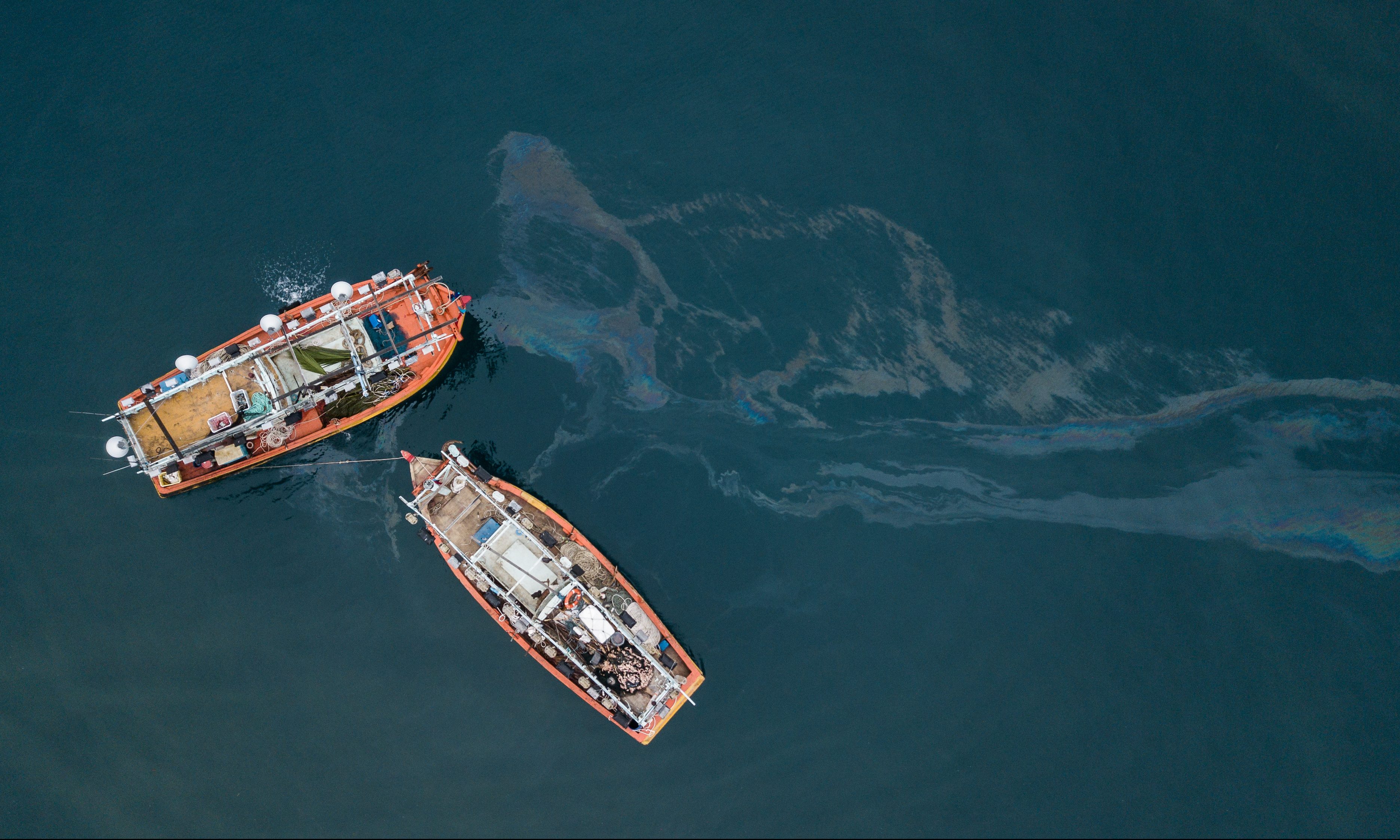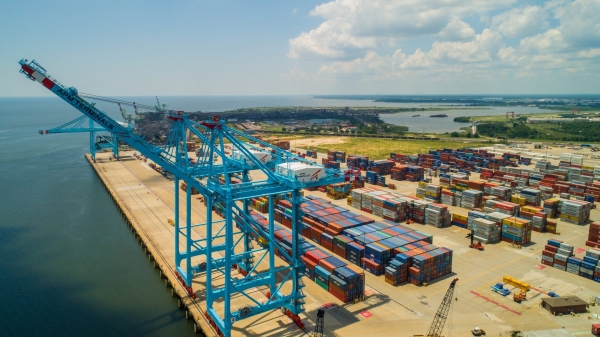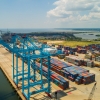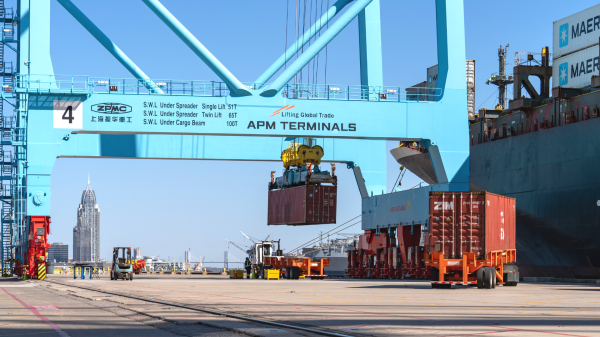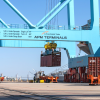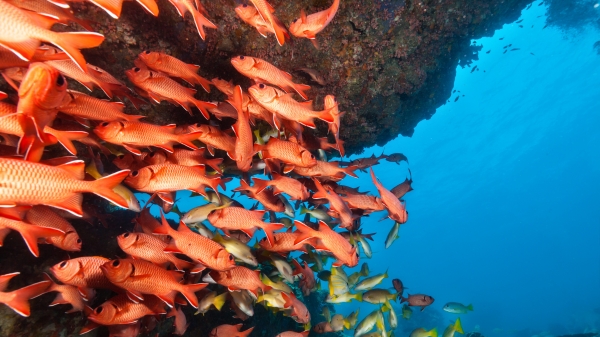An environmental advocacy group on Thursday filed a lawsuit against the Trump administration claiming the government is allowing offshore oil drillers to skip critical safety tests put in place to prevent another event like the deadly Deepwater Horizon disaster.
The Washington D.C.-based nonprofit legal advocacy group Democracy Forward filed a civil suit in the U.S. District Court for the District of Columbia against the U.S. Department of the Interior, the department’s secretary, David Bernhardt, the Bureau of Safety and Environmental Enforcement (BSEE) and director, Scott Angelle. The lawsuit was filed on behalf of Healthy Gulf, a Louisiana nonprofit environmental group that advocates for the protection of the Gulf of Mexico.
The suit alleges that Angelle “secretly and unlawfully” amended rules put in place after BP’s Deepwater Horizon disaster that allow oil companies to skip critical safety tests of “blowout preventers” through the use of waivers, which don’t receive public scrutiny and are handled out-of-sight at a rate of “at least one per day.”
On April 20, 2010, the Deepwater Horizon offshore oil rig exploded, killing 11 workers and ultimately dumping more than 3.2 million barrels of oil into the gulf, killing marine life and fouling coastlines along Florida, Alabama, Mississippi and Louisiana.
The rig’s blowout preventer, a safety device designed to stop the unintended release of natural gas and oil, had last been inspected in 2005, and had been damaged in a previously unreported incident. Inspectors say the preventer failed to properly engage which resulted in the explosion. Other problems with the rig also contributed to the disaster, safety review’s discovered.
“By returning the regulation of blowout preventers to the pre-Deepwater Horizon status quo, Defendants have substantially increased the chances of a catastrophic oil spill in United States coastal waters and, in turn, the chances of irreparable damage to the natural resources upon which Plaintiff’s members rely,” the complaint states.
The Obama administration instituted what’s called the Well Control Rule in April 2016, that put into place dozens of requirements meant to safeguard against another blowout disaster, through rules for “the design, installation, and testing of the blowout preventers…” according to the complaint.
Offshore drilling companies opposed major portions of those rules, however, and in May 2017, Trump’s administration nullified several of the Obama-era safety measures. Still, oil companies are requesting, and being given, waivers that allow them to operate without meeting some of the new safety rules.
The lawsuit alleges that the Department of the Interior has used the Well Control Rule’s provisions for “case-by-case, ad hoc exceptions from its requirements in order to grant hundreds (and likely thousands) of waivers to offshore operators seeking to avoid the Rule’s blowout preventer requirements, particularly those requirements relating to the testing of blowout preventers, which are designed to ensure that blowout preventer systems will work properly in the event of an emergency.”
Emails obtained by Politico through a Freedom of Information Act request show that the Trump administration sought to circumvent those safety rules through the use of waivers, according to the news outlet on Tuesday.
“While we have discussed the possibility of promulgating a rule that further delays the implementation of the dates of the yet to be effective dates of several provisions of the [Well Control Rule] we are revisiting the entire [rule], please advise the possibility of avoiding that by considering evaluation of departure request of the proposed April 2018 rule,” BSEE Director Scott Angelle wrote in a September 2017, email, according to Politico.
Politico’s article also stated that staff urged Angelle to put those directives into writing, but that it’s unclear if the Bureau of Safety and Environmental Enforcement has done so.
According to Politico’s Ben Lefebvre, more than a third of the 1,679 waivers granted during the first 20 months after the new rules went into effect allowed companies to forgo regulations that required tests of blowout preventers.
Cynthia Sarthou, director of Healthy Gulf, told APR on Thursday that prior to the BP disaster, the BSEE was lax in its regulation of offshore drilling, largely following the industry’s lead on safety measures.
“We saw the results on our lives and our livelihoods of what an oil disaster really looks like in the Gulf of Mexico,” Sarthou said. “And that if you’re going to pursue this industry in the Gulf of Mexico you need to be held to account for compliance with safety regulations that protect workers, and protect the environment, which in turn, protects our economy.”
According to the Center for Biological Diversity the Deepwater Horizon disaster “likely harmed or killed about 82,000 birds of 102 species; about 6,165 sea turtles; as many as 25,900 marine mammals; and a vast (but unknown) number of fish.”
The BP disaster was an environmental one, to be sure, but it was also an economic disaster for the many people who relied on the Gulf to make their living, Sarthou said. After years of litigation, BP will pay $65 billion toward the cleanup, but thousands of people lost their jobs.
The BP disaster cost the Gulf of Mexico’s fishing industry between $94.7 million and $1.6 billion and between 740 and 9,315 people lost their jobs, according to the U.S. Bureau of Ocean Energy Management.
Sarthou said it’s also not clear if companies are being scrutinized for past safety violations, or would be able to afford to pay for a disaster like BP’s, before being given waivers, because the agency hasn’t made clear the process it’s using and it’s not naming the companies.
In an emailed statement to APR on Friday, U.S. Department of Interior (DOI) spokesperson Nick Goodwin wrote, “The lawsuit grossly misrepresents the facts and issues false accusations that challenge a nonexistent ‘Waiver Rule.’ Contrary to these fabricated allegations, BSEE has not waived requirements nor granted exemptions to the regulations regarding either the 2016 or the 2019 Well Control Rule.”
That blanket denial from the DOI to APR seemed to run counter to previous in-depth reporting by Politico and even statements from Republican lawmakers who expressed support for the agency’s loosening of regulations.
Rep. Kevin Hern, R-Okla., told Politico in March that worries from Democrats over the waiver issuances were “misguided” and that “BSEE having to provide nearly 1,700 waivers to the well control rule is clear evidence the rule imposes unrealistic requirements and that waivers are necessary to remedy the issues the rules cause.”
Responding to APR’s followup questions to Goodwin to reconcile his earlier statement, that the BSEE has issued no waivers, Goodwin forwarded to APR a letter written to the chairman of the Committee on Natural Resources by Lars Herbst, regional director of the BSEE’s Gulf of Mexico Bureau on March 6, 2019.
In the letter Herbst states that previous press coverage of the matter contained “inaccuracies” and wrote that the BSEE had issued no “waivers” but instead had approved the use of “alternate procedures or equipment (sometimes informally referred to as “alternate compliance”)” which is allowed by federal regulations. He also wrote that the engineering review process for granting such “alternate compliances” hadn’t changed from the previous administration.
Asked to clarify what appeared to be a purposefully misleading statement and a mincing of words between “waiver” and “alternate compliance” Goodwin replied to APR that he “couldn’t disagree more. The letter clearly explains the coverage has been misleading on this, and the statement speaks for itself in response to the lawsuit.”
Goodwin also pointed to a section of the preamble to the final Well Control Rule that states the BSEE can grant the use of “alternate procedures or equipment” if a company “provide sufficient justification” and “provide a level of safety and environmental protection that equals or surpasses current requirements.”
Further into that same preamble, however, it states that the BSEE doesn’t set specific requirements for justifying the need for “alternate compliances” and doesn’t require companies to demonstrate it can achieve the same level of safety and environmental protection. (APR bolded wording for emphasis)
“With respect to requests for departures from operating requirements, BSEE does not specify the type of justification required because doing so could unnecessarily limit the submission of supporting documentation that could be pertinent under the various circumstances that might arise. Moreover, even though existing § 250.409 and proposed § 250.702 do not expressly require an operator seeking a departure to demonstrate that the operator can still achieve the same level of safety and environmental protection required by the rules, BSEE expects that any request for departure will include appropriate measures to ensure safety and environmental protection.”
Charisma Troiano, spokeswoman for Democracy Forward, in a statement to APR Friday regarding DOI’s responses wrote that “DOI is trying to talk its way out of documented proof that a political appointee looked for ways to delay blowout preventer requirements, and against that backdrop the agency approved hundreds of waivers to these safety rules when asked by the offshore drilling industry.”
The oil industry promptly pushed back against the new regulations when they took effect, saying the cost to implement the changes was too high and they wouldn’t make offshore drilling any safer.
“At a time when the entire oil and natural gas industry is facing a historic downturn regarding prices, the last thing we need is new regulations that further stifle development,” Louisiana Oil and Gas Association spokesman Ragan Dickens told the Baton Rouge Business Report in 2016.
The BSEE itself at the time cited the agency’s own economic study that found the changes would save those companies money, according to the Business Report.
“The estimated overall cost of the rule (outside those costs that are part of the economic baseline) over 10 years will be exceeded by the time-savings benefits to the industry resulting from the revisions to the former requirements for [blowout preventer] pressure testing frequency for workovers and decommissionings,” reads the BSEE’s final rule. “In addition, the final rule will also produce benefits to society, both quantifiable and unquantifiable, by reducing the probability of well control incidents involving oil spills.”
If those companies are truly worried about their bottom lines, Sarthou said they should consider the cost of not following the rules.
“There are many companies in the Gulf that do not have a net worth of $60 billion,” Sarthou said. Another disaster by a company without BP’s deep pockets could leave that cleanup bill to taxpayers, she said.
“It’s something that affected millions of people, and It could still affect millions of people,” Sarthou said of the BP disaster and the possibility of future disasters.
The offshore oil drillers are drilling deeper and deeper, she said, and the safety issues increase the further down they go.
“So you would think it would be even more important that they be held to rigorous standards as they go into deeper waters,” she said.
Drilling companies have tapped out the shallower reserves in the Gulf of Mexico and are heading into deeper waters, where operating is more difficult and more expensive, according to The Times-Picayune.
In 2021, Chevron plans for the delivery a new “ultra deep water” and “ultra high pressure” oil rig in the Gulf through a contract with Transocean, the same company that built the Deepwater Horizon rig.
Chevron has other ultra deep water projects around the world, but the company’s new rig in the Gulf would be the first “ultra-high pressure” oil rig in the world to go online, according to the Wood Mackenzie. Such rigs would operate at pressures up to 20,000 psi.
In June 2018, another ultra deep water oil project by BP off of Nova Scotia leaked 36,000 gallons of synthetic drilling mud. The Canada Nova Scotia Offshore Petroleum Board found the accident was the result of “mechanical failure.”






































